JTA: The Candidates’ Stances on Israel
Jan 29 2016 / 3:19 am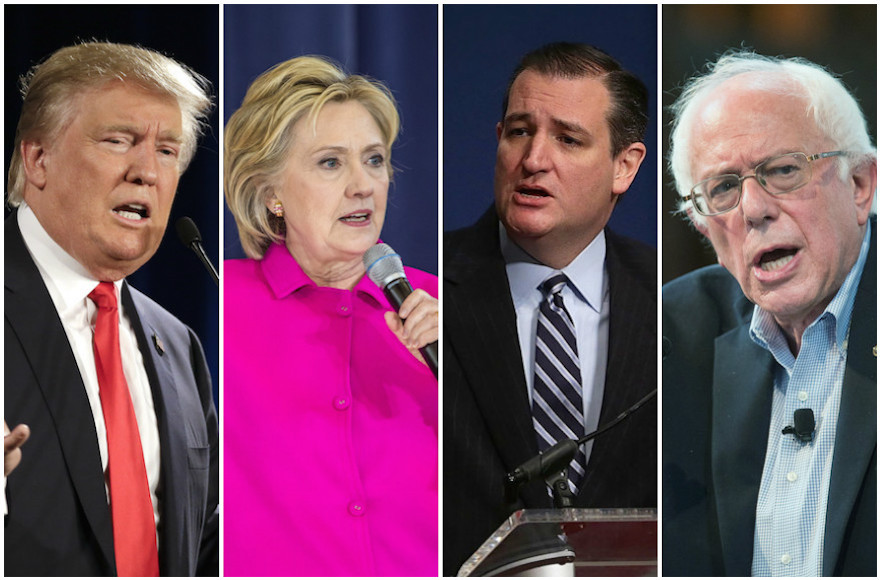
Report by JTA: “Ahead of the Iowa caucus: A Jewish guide to the presidential candidates”
On Monday, Iowans will gather to launch the 2016 presidential election with an arcane ritual — the caucus.
In living rooms and meeting halls throughout the state, caucus-goers will group themselves into clusters according to which presidential candidate they favor. By the end of the day, two real-life winners will emerge: not a “leader in the polls,” not a “likely front-runner,” but the Democrat and Republican who will have secured Iowa’s delegation to the parties’ respective conventions in the summer.
Iowa’s delegates, which come as a bloc, account for just 1 percent or so of the national total. But their selections will be the first substantive results in what has been a raucous and unpredictable campaign, rife with speculation, especially on the Republican side.
A week and a day later, voters in New Hampshire will cast ballots in a more straightforward process, and by the late hours of Feb. 9, the race will truly be on – with the media in hot pursuit. At JTA, the question is what it has been for nearly a century: What does all this mean for the Jews?
In that spirit, here’s a look at the leading candidates – their Jewish friends, family, advisers and donors, their stances on Israel and their Jewish-related controversies.
THE REPUBLICANS
Donald Trump, 68, real estate magnate, reality TV star

Donald Trump at a campaign rally at the American Airlines Center in Dallas, Sept. 14, 2015. (Tom Pennington/Getty Images)
Jewish cohorts
Trump’s daughter, Ivanka, is married to Jared Kushner, the Jewish publisher of the New York Observer and, like her, the child of a real estate magnate. She underwent an Orthodox conversion before marrying, and the couple are raising their children Jewish. Donald Trump, a billionaire with a natural gift for generating free publicity, has yet to tap major donors, but given his New York origins and his professional fields – real estate and show business – it’s not surprising that some of his closest associates are Jewish. One of his leading proxies in the media is Michael Cohen, the Trump Organization’s Jewish executive vice president.
Stance on Israel
Trump, who as a negotiator made his name playing his cards close to the chest, declined last month to commit to recognizing all of Jerusalem as Israel’s capital, explaining that doing so could preempt any bid for Israeli-Palestinian peace. That earned him boos at the Republican Jewish Coalition presidential forum. This month, he said he would move the U.S. Embassy to Jerusalem. Like the other GOP candidates, he does not like the Iran deal, but he is one of several who has refused to say he would scrap it outright. He also wondered at the RJC event whether Israel has the “commitment” to make peace.
Controversy
Trump’s Republic Jewish Coalition forum appearance made headlines less for his refusal to embrace right-wing pro-Israel doctrine than for his joshing with the audience about how skilled everyone in the room was at making money. He likes compliments, and has retweeted flattery, even when it seemingly comes from white supremacists. He has also slipped a couple Nazi symbols into tweets, before pulling the posts down and claiming oversights.
He has also achieved the neat trick of uniting pretty much the entire Jewish spectrum in condemnation of his proposals to ban Muslim entry into the United States, shut down some mosques and create a Muslim registry.
READ: When it comes to Jewish ties, no GOP candidate trumps Trump
Ted Cruz, 45, Texas senator
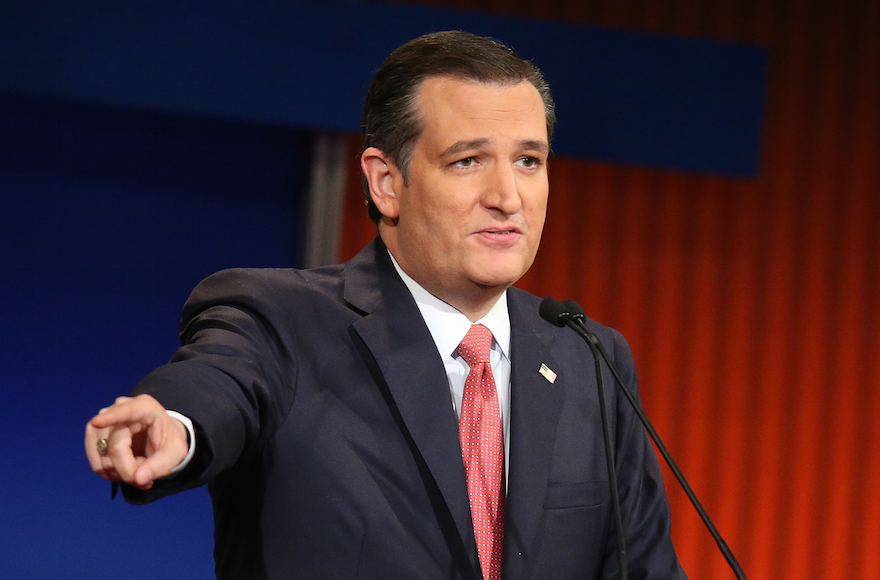
Sen. Ted Cruz making a point at the Republican presidential debate in South Carolina, Jan. 14, 2016. (Scott Olson/Getty Images)
Jewish cohorts
Much has been written in recent days about the four billionaires funding Cruz’s insurgent candidacy; none of them are Jewish. But Sheldon Adelson, the casino magnate and GOP kingmaker, says he and his wife have yet to settle on a candidate, and while Adelson favors Marco Rubio, Miriam Adelson favors Cruz.
Cruz has not shied from cultivating Jewish fundraisers. He made headlines last spring when, despite his strongly conservative bona fides, he met with two Jewish and gay hoteliers. The “gay” part is what made headlines, but the hoteliers’ pro-Israel interests is what led to the meeting. Cruz’s point man in the Jewish community is Nick Muzin, a rising young political player and an Orthodox Jew.
Stance on Israel
Cruz says he would scrap the Iran nuclear deal and move the embassy to Jerusalem as soon as he enters office. He says he also would invite Israeli Prime Minister Benjamin Netanyahu to attend his first State of the Union address. Cruz has cultivated the pro-Israel right, appearing at Zionist Organization of American events and organizing an anti-Iran rally on Capitol Hill last summer.
Controversy
Cruz has taken to bashing neoconservatives, blaming them for for overseas interventions – including the Iraq War – that he says have weakened America. He also has insistently disparaged “New York values.” Some see his references to both groups – neoconservatives and New Yorkers – as coded attacks on the Jews. His supporters cry nonsense, saying his issue is with policy and values.
READ: Ted Cruz aims to liberate GOP from ‘crazy’ neoconservatives
Marco Rubio, 44, Florida senator

Republican presidential candidate Marco Rubio speaking at a rally in Marshalltown, Iowa, Jan. 6, 2016. (Scott Olson/Getty Images)
Jewish cohorts
Norman Braman, a South Florida car retailer, has been Rubio’s principal backer since his days in the Florida Legislature and employs Rubio’s wife, Jeanette Rubio, at his family’s charitable foundation. Sheldon Adelson is said to favor Rubio, although he has yet to commit, and late last year, Rubio secured the backing of Paul Singer, a hedge fund billionaire who is deeply involved in pro-Israel funding. As far as those neocons Cruz is running away from, Rubio says bring them on and seeks their advice. He has consulted with prominent Jewish thinkers and Republican administration veterans Elliott Abrams, Robert Kagan and Eric Edelman. He also has met with Henry Kissinger, President Richard Nixon’s secretary of state.
Stance on Israel
Rubio says he would move the embassy to Jerusalem and scrap the Iran deal. His campaign website has an Israel page, and it faithfully reflects right-wing pro-Israel talking points.
Controversy
Debbie Wasserman Schultz, the Jewish chair of the Democratic National Committee, slammed Rubio for attending a fundraiser at the home of Harlan Crow, who collects Nazi art. Rubio fired back with outrage of his own, and by most accounts came out on top in the exchange.
READ: Rubio pledges Israel trip would be first presidential visit abroad
Jeb Bush, 62, former Florida governor
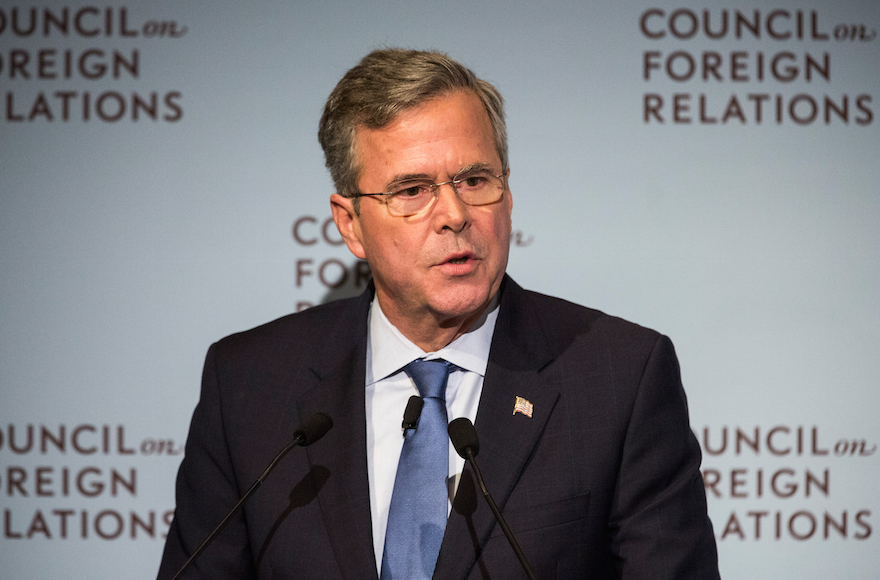
Jeb Bush speaking at the Council on Foreign Relations in New York City, Jan. 19, 2016. (Andrew Burton/Getty Images)
Jewish cohorts
More than any other candidate, Bush has garnered the support of the Jewish Republicans who backed his brother President George W. Bush. Among donors, these include Fred Zeidman, a Texas businessman, and Mel Sembler, a Florida real estate magnate. Jeb Bush’s advisers include some of the most senior Jewish veterans of the second Bush administration, including former Homeland Security Secretary Michael Chertoff and former Attorney General Michael Mukasey.
Stance on Israel
Bush also has said he will move the U.S. embassy to Jerusalem, but like several candidates who strongly oppose the Iran nuclear deal, he says it would likely be too late to scrap it by the time the next president assumes office.
Controversy
Bush raised conservative pro-Israel hackles when he named his father’s secretary of state James Baker as an adviser. Baker has clashed with Israel and the Jewish community. It didn’t help when within a month of coming on board with Jeb Bush, Baker addressed J Street, the liberal Jewish Middle East policy group, and extolled the virtues of pressuring Israel. Bush has said that while he values Baker’s deep reservoirs of experience – overall, the George H. W. Bush presidency is considered a foreign policy success story – he does not look to him for Israel advice.
READ: On foreign policy, Jeb Bush navigates between brother and father
Ben Carson, 64, retired neurosurgeon, best-selling author
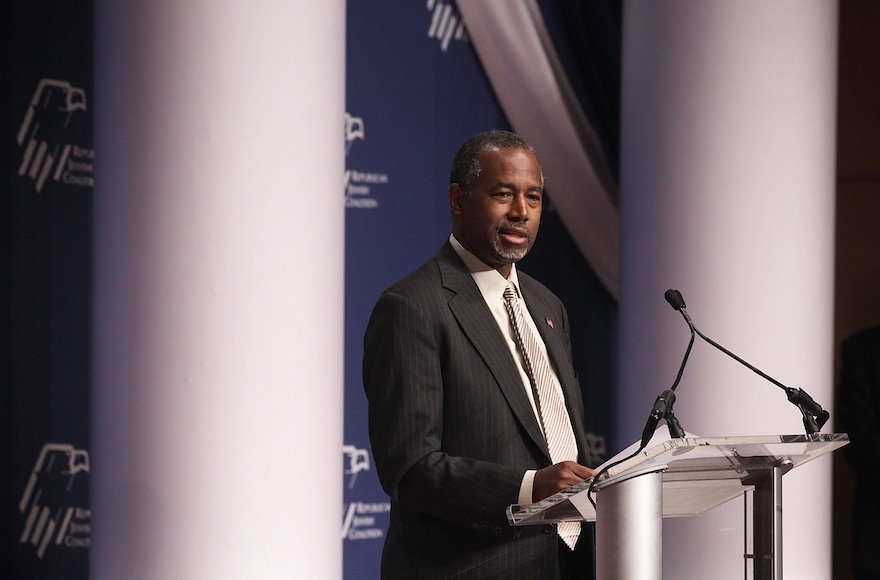
Ben Carson addressing the Republican Jewish Coalition in Washington, D.C. Dec. 3, 2015. (Alex Wong/Getty Images)
Jewish cohorts
Among Carson’s foreign policy advisers is George Birnbaum, who served as chief of staff for Netanyahu during his first term, from 1996 to 1999, and has been a partner to Arthur Finkelstein, the GOP public relations guru and political wizard who also has advised Netanyahu. In speaking of anyone advising Carson, especially on foreign policy, there is an enormous caveat: He does not like taking advice, and some of his advisers have, on the record, called him out on it – extraordinary, if not unprecedented, during a presidential campaign.
Stance on Israel
Carson has said he will abandon the Iran deal and has accused the Obama administration of abandoning Israel. But in real time, he seems less than familiar with the country and the challenges it faces. At the Republican Jewish Coalition forum, he mangled the pronunciation of “Hamas,” making it sound like “hummus.” More substantively, the speech he delivered – awkwardly, from notes – appeared to suggest that if only Fatah and Hamas learned to get along, peace would be achievable.
Controversy
Carson earned rebukes from much of the Jewish establishment last year when he suggested that gun control was in part responsible for the Holocaust. He refused to stand down.
READ: Ben Carson is a Seventh-day Adventist. Here’s why it matters
John Kasich, 63, Ohio governor
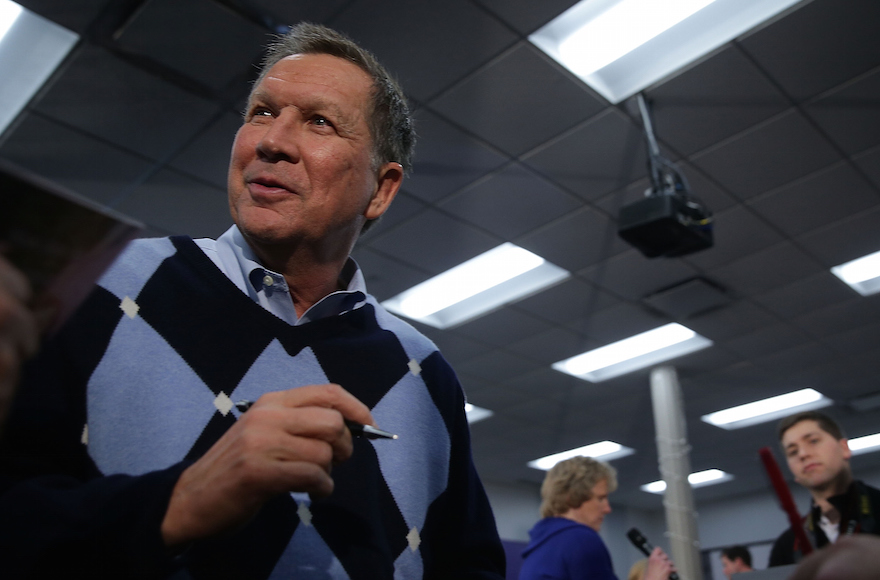
John Kasich at a town hall meeting in Davenport, Iowa, Jan. 27, 2016. (Alex Wong/Getty Images)
Jewish cohorts
Kasich has friends of longstanding in Ohio’s Jewish community, including Brad Kastan, a financial advisor; Albert Ratner, the scion of a family of Ohio real estate magnates; Gary Heiman, a textile industry executive, and Jay Schottenstein, whose family is listed as the 100th most wealthy by Forbes for its fashion business. The state’s governor delivered an emotional eulogy at the 2014 funeral of Gordon Zacks, heir to a footwear fortune and a prominent pro-Israel advocate who hosted Kasich on an Israel tour. A congressman from 1983-2001, Kasich is friendly with Natan Sharansky, the former Soviet dissident and now the chairman of the Jewish Agency for Israel, and frequently drops his name. Kasich pushed for the building of a Holocaust memorial in Columbus, the state capital.
Stance on Israel
Kasich, like the other Republicans in the race, has blamed the Obama administration for the tensions between the governments; unlike many of the others, he has not committed to moving the embassy to Jerusalem, and has said that scrapping the Iran nuclear plan would be foolish, however misbegotten it is.
Controversy
Kasich, addressing the Republican Jewish Coalition forum, delivered an encomium to Jewish friendship that may have seemed in place among his many Jewish friends in Ohio, but that raised eyebrows as trading in stereotypes – however flattering — in a national setting. “My mother told me one time, I was a very young man, she said, ‘Johnny if you want to look for a very good friend, get somebody who’s Jewish,’” he said. He has also proposed creating a “Department of Judeo-Christian Values,” while struggling to explain what that means, and has taken to berating Jewish reporters about their shul attendance.
Chris Christie, 53, New Jersey governor
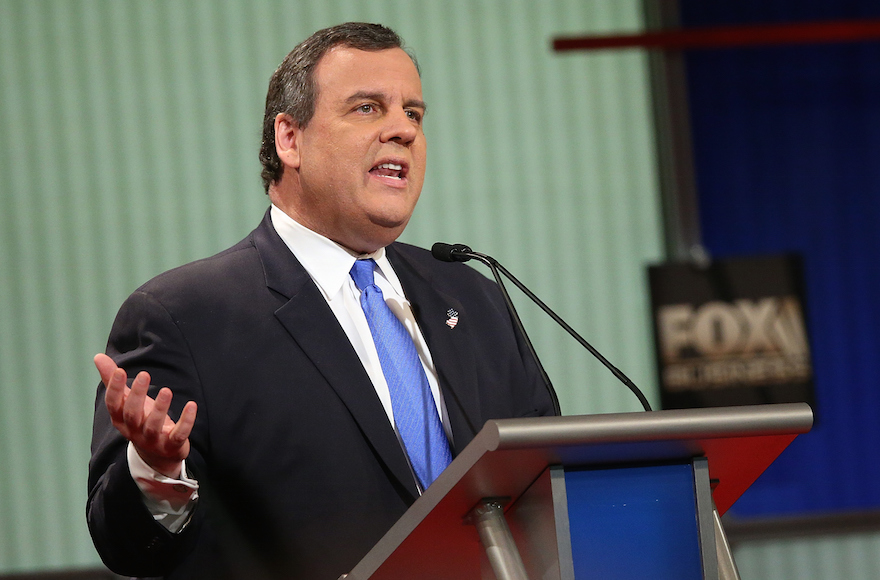
Chris Christie participating in the Fox Business Network Republican presidential debate in Charleston, South Carolina, Jan. 14, 2016. (Scott Olson/Getty Images)
Jewish cohorts
C’mon – he’s from Jersey! Seriously, Christie’s best-known Jewish connection is also notorious for being the wealthiest Jewish Wall Streeter who does not give to Jewish causes: Hedge Fund billionaire Steven A. Cohen, who is one of Christie’s national finance chairmen. Other national finance chairmen include Jeff Fox of St. Louis, whose father, Sam Fox, was a major George W. Bush backer and a past chairman of the Republican Jewish Coalition; and Bill Kilberg of the Washington suburbs in northern Virginia, a major donor to the Hebrew University of Jerusalem.
Stance on Israel
Christie, like every other GOP candidate, says Obama has poisoned the relationship, and this month promised that one of his first acts as president would be to squirrel Netanyahu away for a weekend and let him vent about the previous eight years. He has said he would also ask his aides how best to get out of the Iran nuclear deal.
Controversy
Christie, speaking in Las Vegas in 2014 to the Republican Jewish Coalition, used the term “occupied territories.” Mort Klein, the Zionist Organization of America president, upbraided him for the heresy on the spot, and later the same day, Christie apologized to Adelson, whose Venetian resort hotel was the venue for the event.
THE DEMOCRATS
Bernie Sanders, 74, Vermont senator
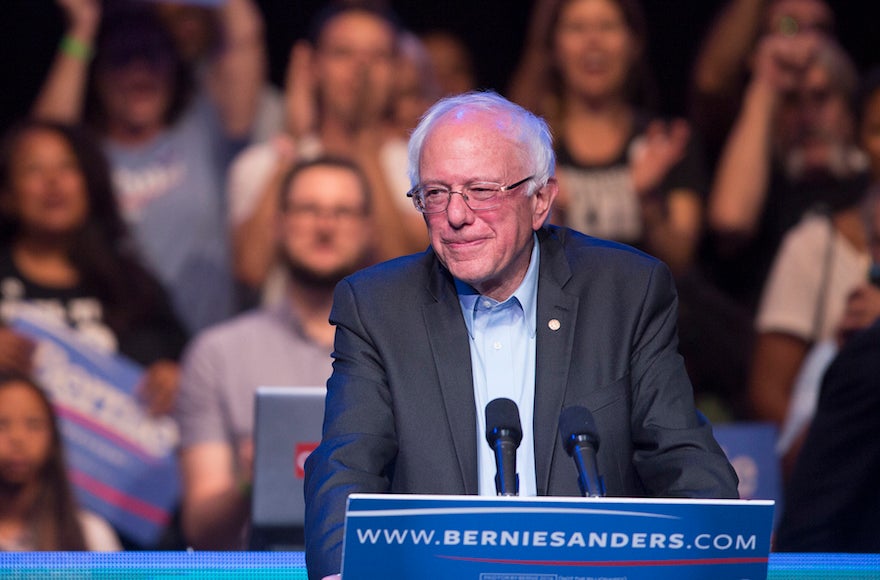
Democratic presidential candidate Bernie Sanders speaking at a campaign fundraising reception in Los Angeles, Oct. 14, 2015. (David McNew/Getty Images)
Jewish cohorts
Sanders is Jewish and spent time on a kibbutz with his first (Jewish) wife, although which kibbutz, no one has been able to determine, despite arduous efforts by Jewish journalists. Not long after his Israel sojourn, Sanders moved to Vermont, where he became best friends with two Jewish guys – philosopher Richard Sugarman [who is, reportedly, an “unapologetic Zionist” who is , “left of center on every issue ‘except Israel’.”] and Huck Gutman, a professor of literature at the University of Vermont with a fondness for Yehuda Amichai [an Israeli poet who fought in several of Israel’s wars].
Stance on Israel
Since his days as mayor of Burlington in the 1980s, Sanders has been unstinting both in his criticism of Israel’s policies toward the Palestinians and his support of Israel’s right to exist and defend itself. He backed the Iran nuclear deal.
Controversy
Sanders’ older brother, Larry, based in Oxford, England, last year tweeted “yes” to whether he supports the Boycott, Divestment and Sanctions movement, or BDS, against Israel and favors dismantling Israel’s weapons of mass destruction. Bernie Sanders’ campaign won’t comment, but, brothers, right?
[Much more at Where does Bernie Sanders, the Jewish candidate for president, stand on Israel?
At a town hall in Cabot, Vermont, during last summer’s Gaza war, a constituent commended Sanders for not signing onto a Senate resolution that solely blamed Hamas for the conflict, but wondered if he would “go further.”
“Has Israel overreacted? Have they bombed U.N. facilities? The answer is yes, and that is terribly, terribly wrong,” Sanders said.
“On the other hand – and there is another hand – you have a situation where Hamas is sending missiles into Israel – a fact – and you know where some of those missiles are coming from. They’re coming from populated areas; that’s a fact. Hamas is using money that came into Gaza for construction purposes – and God knows they need roads and all the things that they need – and used some of that money to build these very sophisticated tunnels into Israel for military purposes.”
Hecklers interrupted, some shouting epithets.
“Excuse me, shut up, you don’t have the microphone,” Sanders said. “You asked the question, I’m answering it. This is called democracy. I am answering a question and I do not want to be disturbed.”
As mayor of Burlington, Vermont, in 1988, Sanders was asked if he backed then-candidate for president Jesse Jackson’s support for the Palestinians during the first intifada. Sanders excoriated what he depicted as Israeli brutality as well as Arab extremism.
“What is going on in the Middle East right now is obviously a tragedy, there’s no question about it. The sight of Israeli soldiers breaking the arms and legs of Arabs is reprehensible. The idea of Israel closing down towns and sealing them off is unacceptable,” he said at a news conference, according to video unearthed by Alternet writer Zaid Jilani. “You have had a crisis there for 30 years, you have had people at war for 30 years, you have a situation with some Arab countries where there are still some Arab leadership calling for the destruction of the State of Israel and the murder of Israeli citizens.”
Sanders said the United States should exercise the prerogative it has as an economic power.
“We are pouring billions of dollars in arms into Arab countries. We have the clout to demand they and Israel, who we’re also heavily financing, to begin to sit down and work out a sensible solution to the problem which would guarantee the existence of the State of Israel and which would also protect Palestinian rights,” he said.]
READ: The Jewish Bernie Sanders only Vermonters know
Hillary Rodham Clinton, former secretary of state, former senator from New York, former first lady

Hillary Clinton speaking at an event at an elementary school in Clinton, Iowa, Jan. 23, 2016. (Brendan Hoffman/Getty Images)
Jewish cohorts
Like Trump, Clinton has a Jewish son-in-law, Marc Mezvinsky, an investment banker whose mother, Marjorie Margolies-Mezvinsky, then a Democratic congresswoman from Pennsylvania, provided the critical vote in 1993 that passed President Bill Clinton’s first budget. In Clinton’s world, with its layers of loyalties, this is as tight as it gets. [Chelsea’s father-in-law was served five years in prison for a “Nigerian” scam].
Bill and Hillary Clinton were accruing Jewish fans even before they moved to Arkansas as a couple. Bill Clinton had a Jewish fan base as the state’s governor and attracted Jewish supporters when he ran for president in 1992, many who remain loyal to Hillary Clinton. She also has cornered the party’s Jewish fundraisers, and her rival for Jewish loyalty in 2009, Barack Obama, has given his blessing to his Jewish supporters to back Clinton this election.
Her most prominent backer may be Haim Saban, the Israeli-American entertainment magnate. One of her closest and most loyal advisers is Martin Indyk, whom she met during her husband’s presidential campaign when Indyk headed the Washington Institute for Near East Policy, a think tank he had spun off from the American Israel Public Affairs Committee. Indyk, a veteran of the failed Israeli-Palestinian peace efforts of both the Clinton and Obama administrations, is now vice president at the Brookings Institution.
Stance on Israel
Clinton has ties with Israel dating back to her days as first lady of Arkansas, when she adopted an Israeli early education program for the state. Since quitting as Obama’s first secretary of state, she has broadly embraced his quest for Israeli-Palestinian peace as well as his Iran policy – indeed, she now credits herself as one of the architects of both policies – but she has also emphasized subtle differences. Clinton has suggested she was not comfortable with making settlements a key point of contention between the Obama and Netanyahu governments, and she says she would closely monitor Iran’s compliance with the nuclear deal.
Controversy
Despite her closeness to Israel, Clinton’s decades in the spotlight mean every inflection has come under microscopic examination. Paul Fray, who managed her husband’s failed 1974 congressional race, says she called him a “f—ing Jew bastard” on election night, although he also acknowledges the Clintons did not know at the time that he was one-eighth Jewish. The Clintons deny any such exchange.
Clinton was the first official in her husband’s government to speak openly about the prospect of a Palestinian state. As first lady, Clinton embraced Suha Arafat, the wife of the late PLO leader Yasser Arafat, after Suha Arafat delivered a speech accusing Israel of poisoning children. Clinton, who was listening to a simultaneous translation, claims she missed that passage.
When last year, Clinton’s private emails were dumped as part of an investigation into her privacy practices while she was secretary of state, it was revealed that one of her Jewish advisers, Sidney Blumenthal, to whom she remains fiercely loyal, kept sending her anti-Israel screeds by his son, Max. Clinton occasionally complimented Max Blumenthal’s writing to Sidney – but there is no evidence she took any of his son’s advice.
READ: Throughout Hillary Clinton’s life and career, US Jews have been close at hand
THE UNLIKELYS
Rick Santorum, former Republican Senator for Pennsylvania, talked Iran sanctions way before it was fashionable, but on Muslims, is even more prone than Trump to sweeping generalizations.
Carly Fiorina, the former Hewlett Packard CEO, and a Republican, at times sounds like she has Netanyahu on speed dial, but has also been in the sticky position of defending HP sales to Iran.
Mike Huckabee, the former Republican Arkansas governor, is perhaps the candidate who has most frequently visited Israel, leading tours there for evangelical Christians. He is also probably the most pronouncedly opposed candidate to a two-state solution, and is unafraid of Holocaust metaphors to attack his opponents.
Jim Gilmore, the former Virginia governor, a Republican, answered the kishkes question and also took a crash course on Holocaust films.
Sen. Rand Paul, R-Ky., began his congressional career calling for cuts in defense assistance to Israel, but then got himself some Talmud study.
Martin O’Malley, the former Democratic governor of Maryland, signed bills sanctioning Iran and conditioning business with a French rail company on its accounting for its Nazi-era collaboration. He is backed by Howard Friedman, a past American Israel Public Affairs Committee president.

